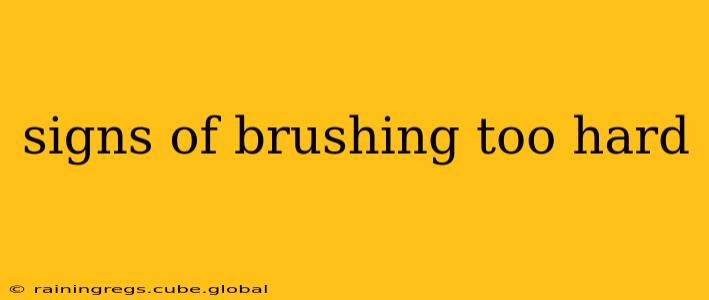Brushing your teeth is crucial for maintaining good oral hygiene, but using excessive force can lead to several problems. Many people unknowingly brush too hard, causing damage to their gums and enamel. This article will explore the telltale signs of brushing too hard and offer advice on how to adopt a gentler technique.
What are the signs of brushing too hard?
This is a key question many people search for. Recognizing the signs early is crucial to preventing long-term dental issues. The most common signs include:
- Bleeding gums: This is the most obvious indicator. If your gums bleed regularly after brushing, it's a strong sign that you're being too aggressive. Healthy gums shouldn't bleed during routine brushing.
- Receding gums: Over time, excessive brushing can wear away the gum tissue, making your teeth appear longer and more sensitive. Receding gums also expose the roots of your teeth, increasing the risk of cavities and infection.
- Sensitive teeth: If your teeth feel unusually sensitive to hot, cold, or sweet foods and drinks, it could be a result of enamel erosion caused by forceful brushing.
- Visible wear on your teeth: Closely examine your teeth. Do you see any noticeable wear or abrasion, particularly near the gum line? This is a clear indicator of aggressive brushing.
- Tooth pain: Persistent tooth pain, especially after brushing, is a serious sign that warrants a visit to the dentist.
- Soreness in your jaw: Brushing too hard can strain your jaw muscles, leading to discomfort and even pain. This is particularly true if you also clench or grind your teeth.
How can I tell if I'm brushing too hard?
Many people aren't aware of how hard they're brushing. Here's how to check:
- Pay attention to the pressure you're applying: Try to consciously relax your grip and use a light touch.
- Use a soft-bristled toothbrush: A hard-bristled brush will exacerbate the damage from forceful brushing.
- Ask your dentist or hygienist: Your dental professional can assess your brushing technique and identify any potential issues. They can also provide personalized recommendations.
What are the long-term effects of brushing too hard?
The consequences of consistently brushing too hard can be severe and long-lasting:
- Gum disease: Aggressive brushing damages gum tissue, making it more susceptible to infection and gum disease (gingivitis and periodontitis).
- Tooth loss: Severe gum recession and bone loss, often resulting from brushing too hard, can eventually lead to tooth loss.
- Increased tooth sensitivity: Enamel erosion caused by harsh brushing leaves the dentin exposed, making your teeth hypersensitive to temperature changes and various stimuli.
What should I do if I think I'm brushing too hard?
If you suspect you're brushing too hard, take these steps immediately:
- Switch to a softer toothbrush: Look for toothbrushes labeled "soft" or "extra-soft."
- Use a gentler brushing technique: Use short, gentle strokes, focusing on each tooth individually.
- Reduce brushing time: Aim for two minutes, twice a day. Longer brushing doesn't necessarily mean better cleaning, especially if you're brushing aggressively.
- See your dentist: Schedule a checkup to assess any damage and get personalized advice. Your dentist can recommend treatments to address any existing issues and help you improve your brushing technique.
How can I brush my teeth without damaging my enamel?
Maintaining good oral hygiene without damaging your enamel requires a delicate balance:
- Choose the right toothbrush: Soft bristles are key.
- Use the right technique: Gentle, short strokes and proper brushing angles.
- Use fluoride toothpaste: Fluoride helps strengthen enamel and protect against cavities.
By understanding the signs of brushing too hard and adopting a gentler approach, you can protect your teeth and gums for a lifetime of healthy smiles. Remember, prevention is key! Consult your dentist for personalized guidance on proper brushing techniques and oral hygiene practices.
